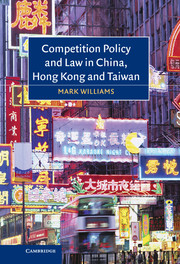Book contents
- Frontmatter
- Contents
- Preface
- Acknowledgements
- List of abbreviations
- 1 Introduction and methodology
- 2 Competition theory and the experience of states adopting competition law
- 3 The international perspective
- 4 China and economic regulation – history, politics and economics
- 5 Existing and proposed Chinese competition provisions
- 6 Competitive Hong Kong? myths, perception and reality
- 7 Implementation of competition policy in Hong Kong 1997–2004: economising with the truth
- 8 Electricity, telecommunication and broadcasting: competition regulation Hong Kong style
- 9 Taiwan - the third China
- 10 Political economy: an explanation of competition policy in Greater China
- 11 Competition policy and law in Greater China: where next?
- Bibliography
- Index
6 - Competitive Hong Kong? myths, perception and reality
Published online by Cambridge University Press: 28 July 2009
- Frontmatter
- Contents
- Preface
- Acknowledgements
- List of abbreviations
- 1 Introduction and methodology
- 2 Competition theory and the experience of states adopting competition law
- 3 The international perspective
- 4 China and economic regulation – history, politics and economics
- 5 Existing and proposed Chinese competition provisions
- 6 Competitive Hong Kong? myths, perception and reality
- 7 Implementation of competition policy in Hong Kong 1997–2004: economising with the truth
- 8 Electricity, telecommunication and broadcasting: competition regulation Hong Kong style
- 9 Taiwan - the third China
- 10 Political economy: an explanation of competition policy in Greater China
- 11 Competition policy and law in Greater China: where next?
- Bibliography
- Index
Summary
Monopoly is a terrible thing, till you have it.
Introduction
This chapter will seek to explain the unique historical, political, social and economic features of Hong Kong as a precursor to a detailed examination of the state of competition within the domestic economy of Hong Kong and the HKSAR government's policies regarding the regulation of competition.
Hong Kong has been perceived very differently depending on the identity of the observer. To imperialist apologists it was the exemplar of enlightened colonial government whereby the mixture of small, competent, uncorrupted, paternalistic government coupled with a dynamic work-orientated population produced nothing less than an economic and social miracle. The dismay of Lord Palmerston, on being informed that Hong Kong Island had been annexed to the British Empire by Captain Elliot, the local British plenipotentiary in 1841, expressed in the oft-quoted retort ‘a barren rock with scarcely a house upon it’, has proved to be a significant underestimation of the Territory's economic potential. In 1997, at the time of the retrocession of the colony to China, Hong Kong's GDP per capita was higher than that of its colonial possessor.
However, to the Chinese patriot Hong Kong represented an open sore that had oozed shame for 150 years as a humiliating reminder of national weakness and successful foreign aggression and encroachment upon the territory of China.
- Type
- Chapter
- Information
- Competition Policy and Law in China, Hong Kong and Taiwan , pp. 222 - 270Publisher: Cambridge University PressPrint publication year: 2005

